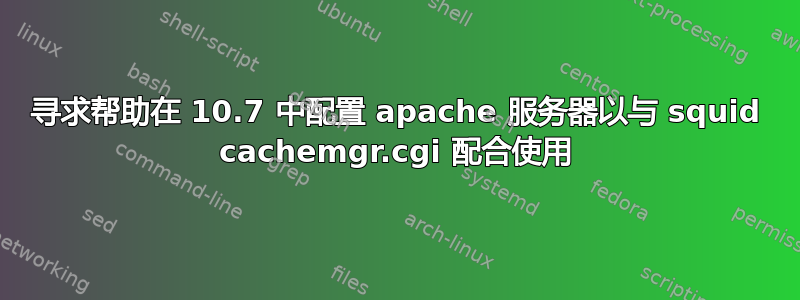
设置是...
# This file controls which servers may be managed by
# the cachemgr.cgi script
#
# The file consists of one server per line on the format
# hostname:port description
#
# Specifying :port is optional. If not specified then
# the default proxy port is assumed. :* or :any matches
# any port on the target server.
#
# hostname is matched using shell filename matching, allowing
# * and other shell wildcards.
localhost:3128
#
# Recommended minimum configuration:
#
acl manager proto cache_object
acl localhost src 127.0.0.1/32 ::1
acl to_localhost dst 127.0.0.0/8 0.0.0.0/32 ::1
# Example rule allowing access from your local networks.
# Adapt to list your (internal) IP networks from where browsing
# should be allowed
acl localnet src 10.0.0.0/8 # RFC1918 possible internal network
acl localnet src 172.16.0.0/12 # RFC1918 possible internal network
acl localnet src 192.168.0.0/16 # RFC1918 possible internal network
acl localnet src fc00::/7 # RFC 4193 local private network range
acl localnet src fe80::/10 # RFC 4291 link-local (directly plugged) machines
acl SSL_ports port 443
acl Safe_ports port 80 # http
acl Safe_ports port 21 # ftp
acl Safe_ports port 443 # https
acl Safe_ports port 70 # gopher
acl Safe_ports port 210 # wais
acl Safe_ports port 1025-65535 # unregistered ports
acl Safe_ports port 280 # http-mgmt
acl Safe_ports port 488 # gss-http
acl Safe_ports port 591 # filemaker
acl Safe_ports port 777 # multiling http
acl CONNECT method CONNECT
#
# Recommended minimum Access Permission configuration:
#
# Only allow cachemgr access from localhost
http_access allow manager localhost
http_access deny manager
# Deny requests to certain unsafe ports
http_access deny !Safe_ports
# Deny CONNECT to other than secure SSL ports
http_access deny CONNECT !SSL_ports
# We strongly recommend the following be uncommented to protect innocent
# web applications running on the proxy server who think the only
# one who can access services on "localhost" is a local user
#http_access deny to_localhost
#
# INSERT YOUR OWN RULE(S) HERE TO ALLOW ACCESS FROM YOUR CLIENTS
#
# Example rule allowing access from your local networks.
# Adapt localnet in the ACL section to list your (internal) IP networks
# from where browsing should be allowed
http_access allow all
http_access allow localhost
# And finally deny all other access to this proxy
#http_access deny all
# Squid normally listens to port 3128
http_port 192.168.1.150:3128 transparent
# We recommend you to use at least the following line.
hierarchy_stoplist cgi-bin ?
# Uncomment and adjust the following to add a disk cache directory.
cache_dir ufs /usr/local/var/cache 100 16 256
# Leave coredumps in the first cache dir
coredump_dir /usr/local/var/cache
# Add any of your own refresh_pattern entries above these.
refresh_pattern ^ftp: 1440 20% 10080
refresh_pattern ^gopher: 1440 0% 1440
refresh_pattern -i (/cgi-bin/|\?) 0 0% 0
refresh_pattern . 0 20% 4320
cachemgr_passwd none all
http_access allow manager localhost
http_access deny manager
visible_hostname test.cache
/private/etc/apache2/httpd.conf
#
# Recommended minimum configuration:
#
acl manager proto cache_object
acl localhost src 127.0.0.1/32 ::1
acl to_localhost dst 127.0.0.0/8 0.0.0.0/32 ::1
# Example rule allowing access from your local networks.
# Adapt to list your (internal) IP networks from where browsing
# should be allowed
acl localnet src 10.0.0.0/8 # RFC1918 possible internal network
acl localnet src 172.16.0.0/12 # RFC1918 possible internal network
acl localnet src 192.168.0.0/16 # RFC1918 possible internal network
acl localnet src fc00::/7 # RFC 4193 local private network range
acl localnet src fe80::/10 # RFC 4291 link-local (directly plugged) machines
acl SSL_ports port 443
acl Safe_ports port 80 # http
acl Safe_ports port 21 # ftp
acl Safe_ports port 443 # https
acl Safe_ports port 70 # gopher
acl Safe_ports port 210 # wais
acl Safe_ports port 1025-65535 # unregistered ports
acl Safe_ports port 280 # http-mgmt
acl Safe_ports port 488 # gss-http
acl Safe_ports port 591 # filemaker
acl Safe_ports port 777 # multiling http
acl CONNECT method CONNECT
#
# Recommended minimum Access Permission configuration:
#
# Only allow cachemgr access from localhost
http_access allow manager localhost
http_access deny manager
# Deny requests to certain unsafe ports
http_access deny !Safe_ports
# Deny CONNECT to other than secure SSL ports
http_access deny CONNECT !SSL_ports
# We strongly recommend the following be uncommented to protect innocent
# web applications running on the proxy server who think the only
# one who can access services on "localhost" is a local user
#http_access deny to_localhost
#
# INSERT YOUR OWN RULE(S) HERE TO ALLOW ACCESS FROM YOUR CLIENTS
#
# Example rule allowing access from your local networks.
# Adapt localnet in the ACL section to list your (internal) IP networks
# from where browsing should be allowed
http_access allow all
http_access allow localhost
# And finally deny all other access to this proxy
#http_access deny all
# Squid normally listens to port 3128
http_port 192.168.1.150:3128 transparent
# We recommend you to use at least the following line.
hierarchy_stoplist cgi-bin ?
# Uncomment and adjust the following to add a disk cache directory.
cache_dir ufs /usr/local/var/cache 100 16 256
# Leave coredumps in the first cache dir
coredump_dir /usr/local/var/cache
# Add any of your own refresh_pattern entries above these.
refresh_pattern ^ftp: 1440 20% 10080
refresh_pattern ^gopher: 1440 0% 1440
refresh_pattern -i (/cgi-bin/|\?) 0 0% 0
refresh_pattern . 0 20% 4320
cachemgr_passwd none all
http_access allow manager localhost
http_access deny manager
visible_hostname test.cache
我去http://本地主机/ 并尝试连接到 cachemgr.cgi 并得到:
缓存管理器错误连接 127.0.0.1:3128: (61) 连接被拒绝
生成于 2012 年 5 月 8 日星期二 01:06:31 GMT,由
cachemgr.cgi/[电子邮件保护]
任何帮助都将非常有帮助。
运行 10.7.x,安装 Squid 的自制端口,并作为透明服务器运行,我破解了 Apache,使其与 cgi 一起工作。我认为问题可能在于配置根 Apache 服务器而不是“~”Apache 服务器。我不太确定。如果我能得到一点帮助,让 Squid 的 cachemgr.cgi 在“~”网络服务器中运行,我想这可能会解决这个问题?另外,我如何才能让它工作而不对其进行破解?因为我不知道如何配置它。
答案1
cachemgr 正在尝试通过 localshot 连接到 Squid,并且您已让代理监听特定接口。删除 http_port 语句中的 IP 地址。


